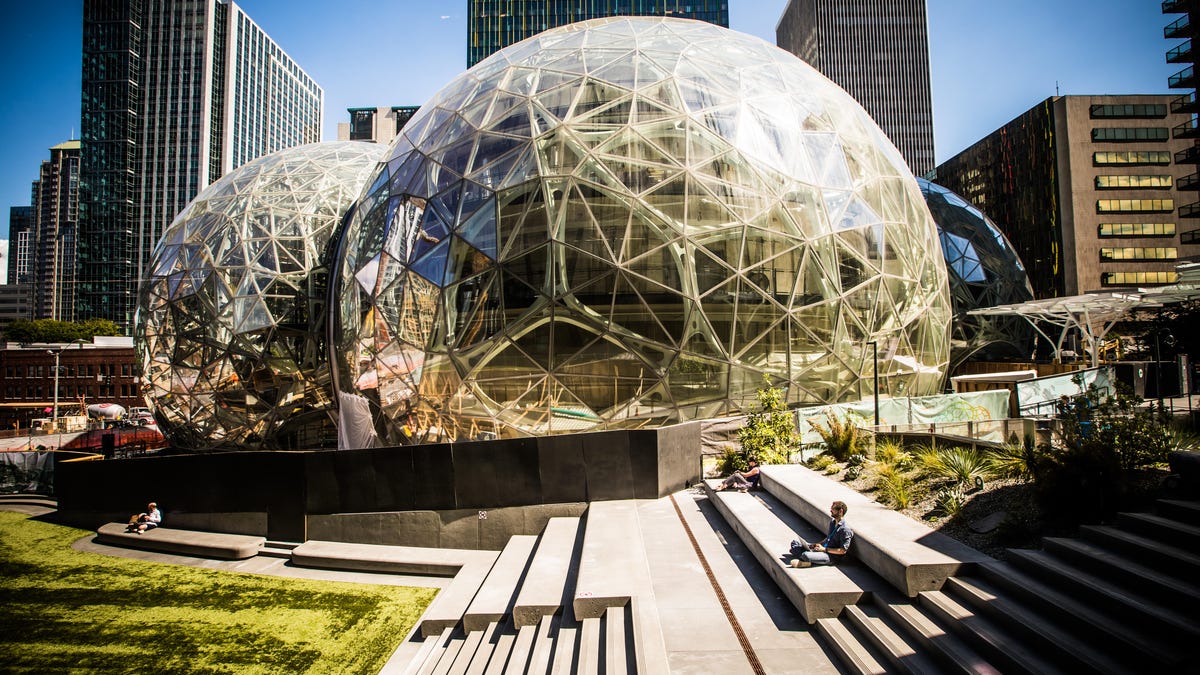Amazon wants a second HQ, and it's got $5 billion to spend
Cities, get your bids ready. The tech giant says it's looking for a "second home" where it could create up to 50,000 high-paying jobs.

At its Seattle campus, Amazon is building these "Spheres" as a nature complex and workspace.
Amazon is now so big it wants a second headquarters.
The world's largest online retailer said Thursday it plans to build a corporate base in a major North American city that will be an equal to its existing Seattle headquarters. It expects to spend over $5 billion on the project, called Amazon HQ2, and hire as many as 50,000 people for high-paying jobs over the next 15 to 17 years.
"We expect HQ2 to be a full equal to our Seattle headquarters," Amazon CEO Jeff Bezos said in a statement. "We're excited to find a second home."
Amazon said it has over 40,000 employees working at its Seattle headquarters, where it has 33 buildings. It spent $3.7 billion on buildings and infrastructure to create the urban campus there.
The company is seeking requests for proposals from cities, to be sent in by Oct. 19. The final site selection is expected to be announced sometime next year.
With the company expanding so quickly, it may now realize it's outgrown the Seattle market and needs to go somewhere else to draw in more talent. In the process of getting that talent, Amazon is likely making this announcement to generate excitement from multiple cities and states in hopes of sparking a bidding war. It could find itself with millions or billions of dollars in tax breaks and other incentives for agreeing to come to any given location.
It's likely many cities will be falling over themselves to bring home a major tech company to bolster their monikers as a "Silicon Something" (Silicon Alley, Silicon Slopes, Silicon Prairie, the list goes on). Other locales may be more hesitant since Amazon has already taken over large chunks of downtown Seattle, helping drive up housing costs in the area.
"They need to go where they can sustain longer-term growth, because there's going to be more," Larry Chiagouris, professor of marketing at Pace University's Lubin School of Business, said Thursday.
He added that Amazon will probably head where it can plan expansions into future industries, plot for additional acquisitions and find ways to connect its vast sets of businesses, from books to clothing to food to web services.
There is precedent in the business world to developing additional headquarters. Several major companies have done so, especially after merging with another big firm and agreeing to maintain both companies' headquarters.
Amazon said Thursday it's looking for a metropolitan area with more than 1 million people and urban or suburban locations with potential to hire tech talent. Amazon is considering a layout similar to its Seattle location, which is in an urban core.
Amazon's new headquarters could help it tap into a new pool of engineering talent, after it's fought to retain and snag candidates from Microsoft in the Seattle area. While Silicon Valley includes plenty of that talent -- and lots of competition for it -- Amazon could also look to the New York City, Boston, Chicago or Denver as potential spots.
This announcement is part of Amazon's continued heavy spending as it looks to keep growing. The company in January said it will spend $1.49 billion to build a new air cargo hub in Kentucky, and it's already in the process of expanding its Seattle headquarters. It also just closed a deal to buy grocer Whole Foods for $13.7 billion.
Amazon has more than 380,000 employees worldwide and said in January it would hire 100,000 people in the US over the next 18 months, though most of these jobs were expected to be lower-paying positions in warehouses. The 50,000 employees for the new headquarters are separate from that goal for 100,000 new hires.
First published at 4:59 a.m. PT.
Update, 11:32 a.m. PT: Adds more context and comments from Pace professor.
The Smartest Stuff: Innovators are thinking up new ways to make you, and the things around you, smarter.
iHate: CNET looks at how intolerance is taking over the internet.

